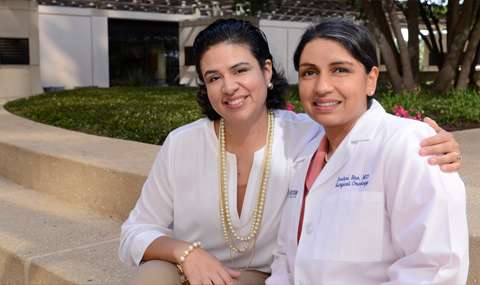Mother of two volunteers to aid study seeking DNA patterns for breast cancer

After having two children in her 30s, Brianna Hinojosa-Flores had been vigilant about getting mammograms and performing breast self-exams, as suggested by her gynecologist. But when she ran for a congressional seat in 2012, she missed a scheduled mammogram by six months.
In May 2013, the now 42-year-old mother felt a lump above her right breast. A mammogram, ultrasound, and biopsy revealed triple negative breast cancer — one of the hardest to treat.
"I was overwhelmed. You prepare for the worst and hope for the best, yet when you see a black, jagged mass on the screen, you know that it's probably not good," said Mrs. Hinojosa-Flores, a patent attorney who had served on her city council in the Dallas suburb of Coppell for seven years.
"With this type of cancer, getting the patient into chemotherapy immediately is vital. The medical oncologist works with me on the same floor, so I was able to walk in and say, 'Here is someone you need to see right away'," said surgical oncologist Dr. Roshni Rao, Director of the George N. Peters, M.D., Center for Breast Surgery at UT Southwestern Medical Center.
Mrs. Hinojosa-Flores began chemotherapy immediately. At the time of surgery (a double mastectomy) in November 2013, pathology results confirmed that she had a 100 percent response to the chemotherapy. No live cancer cells remained in the right breast area, and she did not need additional treatment, including radiation.
But Mrs. Hinojosa-Flores wasn't done. She wanted to help others. So she has joined a local arm of a national clinical trial led by Dr. Rao to collect DNA samples of triple negative breast cancer survivors. The effort is part of a large study, funded by Young Texans Against Cancer, attempting to identify risk factors for hard-to-treat disease.
"Triple negative breast cancer leads to a disproportionate number of breast cancer deaths, particularly among young breast cancer patients," said Dr. Rao, Associate Professor of Surgery. "This study will help us determine if there is a pattern that predicts triple negative breast cancer. When we can identify risk factors, women at high risk can be screened earlier and more frequently."
The study still needs more Hispanic women to participate to help find the genetic similarities across ethnic groups. Researchers have enrolled sufficient numbers of Caucasian and African-American women.
Triple negative breast cancer is associated with the BRCA gene, and can affect women of any ethnicity, but is more common in African-Americans. According to the National Cancer Institute, about 15 percent of breast cancers in Hispanic women are triple negative, compared with 11 percent among whites, 23 percent among blacks, and 10 percent among Asian/Pacific Islanders.
"The purpose of this study is to identify a mitochondrial DNA pattern that predisposes women to this aggressive type of breast cancer," said Dr. Rao.
There is no cost to enroll in the study, which entails a one-time Q-tip swab of tissue inside the mouth. Women can be at any stage of treatment or survival to participate.
Interested breast cancer patients and survivors who have been diagnosed with triple negative breast cancer can call UT Southwestern's research coordinator at 214-648-4981 to enroll.
Dr. Rao, a member of the Harold C. Simmons Comprehensive Cancer Center, focuses her research on exploring ethnic differences in breast cancer, breast cancer in American ethnic populations, surgical treatment for metastatic breast cancer and treatment of locally advanced breast cancer.
According to the American Cancer Society, more than 230,000 women in the U.S. will be diagnosed with breast cancer in 2014. About 10 to 20 percent of these cancers are basal-like, and the majority of basal-like breast cancers are referred to as "triple negative" because they are ER-, PR-, and HER2-negative. Women diagnosed with basal-like breast cancer have a poorer short-term prognosis than those diagnosed with other breast cancer types because there are no targeted therapies for these tumors.
UT Southwestern's Harold C. Simmons Comprehensive Cancer Center is the only National Cancer Institute-designated cancer center in North Texas and one of just 66 NCI-designated cancer centers in the nation. The Simmons Cancer Center includes 13 major cancer-care programs with a focus on treating the whole patient with innovative treatments, while fostering groundbreaking basic research that has the potential to improve patient care and prevent cancer worldwide. In addition, the Center's education and training programs support and develop the next generation of cancer researchers and clinicians.
The Simmons Cancer Center is among only 30 U.S. cancer research centers to be named a National Clinical Trials Network Lead Academic Site, a prestigious new designation by the NCI, and the only Cancer Center in North Texas to be so designated. The designation and associated funding is designed to bolster the cancer center's clinical cancer research for adults and to provide patients access to cancer research trials sponsored by the NCI, where promising new drugs often are tested.
















